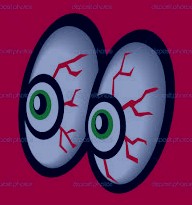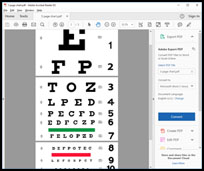Some of you may remember an old Bob Newhart skit where as a psychiatrist, he tells a woman who comes to him for help with an unwanted fear which is limiting her life, to “Stop it!”. The joke of course is that if she knew how to do that, she wouldn’t be in his office.
The woman in the skit is ahead of some of us who have eyestrain. At least she’s identified the behavior she wants to eliminate. There are people with eyestrain for whom it’s so familiar, they don’t fully recognize that their eyes feel tired, or dry, or sore, or that they have a low-level headache most of the time. Could your seeing feel easier and more pleasurable? Might you be putting up with nearly constant eyestrain without admitting it to yourself?
Once the strain is noticed, something can be done about it. Maybe all that’s called for is regular brief breaks from the computer, or a rest stop (well-named!) while driving. If your visual system is sending a message of strain, it’s a call for attention, like a baby’s wail. “Please take care of me!” it’s saying.
Your eyestrain could be from bad habits, like staying up too late, or from working too many hours, or from taking care of others and neglecting yourself. It could be from too-strong or too-weak glasses. Tune into your eyes right now. Do they feel relaxed, moist, and receptive? If not, and they could somehow talk to you, what would they say they need?

For many sensitive people, the visual system is the first sign of discontent, maybe with our overwhelming family responsibilities, or our unsatisfying job, or our finances, or something else. It’s as if our eyes are telling us “I don’t like looking at this situation!”. So they start to complain in the only way they know, trying to get our attention. I’ve met many people for whom vision improvement was a doorway to a happier life overall, once they started facing and addressing what they didn’t want to see.
Please pay attention to your eyestrain. Don’t ignore the warning from your aware eyes that something in your life is out of balance. If you identify the area of concern, and take steps to change it, you can move in a more positive direction. Your vision will be happier, and so will your attitude. With some dedicated focus on caring for your eyes, just like you would for precious children, you can say “Stop it!” to the problem of eyestrain, and place it firmly in your past. Wouldn’t that feel great?

I wore strong glasses, then contact lenses, from age 5 into my 40s. While making many mistakes, eventually l learned how to improve the way I use my eyes and to see in a more relaxed, healthy manner. It is my pleasure to coach others to do the same. Visit me at https://NancyLNeff.com.


